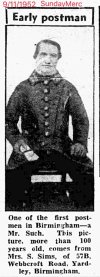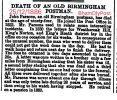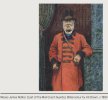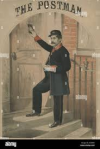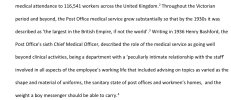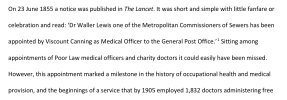-
Welcome to this forum . We are a worldwide group with a common interest in Birmingham and its history. While here, please follow a few simple rules. We ask that you respect other members, thank those who have helped you and please keep your contributions on-topic with the thread.
We do hope you enjoy your visit. BHF Admin Team
You are using an out of date browser. It may not display this or other websites correctly.
You should upgrade or use an alternative browser.
You should upgrade or use an alternative browser.
Postman
- Thread starter Vivienne14
- Start date
Before Rowland Hill, the recipient usually paid for the letter.
Some history here (which states Birmingham had a local penny post from 1793): https://www.gbps.org.uk/information/rates/inland/local-posts.php
Some history here (which states Birmingham had a local penny post from 1793): https://www.gbps.org.uk/information/rates/inland/local-posts.php
Last edited:
Richard Dye
master brummie
Derek, being paid by the sender was a big change! I alway thought it made so much sense.Before Rowland Hill, the recipient usually paid for the letter.
Some history here (which states Birmingham had a local penny post from 1793): https://www.gbps.org.uk/information/rates/inland/local-posts.php
Absolutely, Richard. The Victorian and Edwardian post was really efficient in urban areas. Dickens could exchange letters several times in a morning, before meeting them for a late lunch or evening meal. DerekDerek, being paid by the sender was a big change! I alway thought it made so much sense.
Viv, Robert Peel's police were set up in London in 1829, their uniform of blue tail coat and top hats was carefully chosen to avoid resemblance to the red coats and helmet of the army. I imagine blue uniform for postmen was selected for similar reasons. DerekThis is an image of one of the first Birmingham postmen. The uniform may be of interest to those researching the occupation.The design seems to have police uniform influences. Viv.
View attachment 172481
Source: British Newspaper Archive
I have read that the ranks of the police originally were chosen so as not to be the same as the army, to avoid the public thinking they were a military organisation. thus Superintendent, inspector, constable - apparently originally there was not the rank of Sergeant in the police
The Peterloo Massacre in Manchester was 1819. There was fear of a standing army or militia. Peel thought that a police service would be tolerated where a military force would be resented. 1848 was the year of European revolutions. Uniformed Peelers were often unpopular. My mother told me that they patrolled in pairs in Ladywood. She was born 1908. Public services like the post office and fire brigade were careful not to present themselves as an armed force but as part of civil society.I have read that the ranks of the police originally were chosen so as not to be the same as the army, to avoid the public thinking they were a military organisation. thus Superintendent, inspector, constable - apparently originally there was not the rank of Sergeant in the police
He was armed with two pistols and a blunderbuss. He pre-dates the Victorian blue uniformed postman of course. https://www.postalmuseum.org/collections/mail-coaches/Mail coach guard uniform
Richard Dye
master brummie
Wow! Sounds like the wild Wild West!He was armed with two pistols and a blunderbuss. He pre-dates the Victorian blue uniformed postman of course. https://www.postalmuseum.org/collections/mail-coaches/
mw0njm.
A Brummie Dude

The Postman: Short History of the Delivery of Mail - Geri Walton
The postman of the 1700 and 1800s was not like the postman we have today. They traveled great distances, were exposed to all sorts of dangers, including
www.geriwalton.com
Highwaymen and armed footpads might attack a mail coach. The coach transported cash. Here's a broadside ballad from 1820s.Wow! Sounds like the wild Wild West!
https://digital.nls.uk/broadsides/view/?id=15456
Exactly as the Wild West was mythologised, so was the criminal underworld. Daniel Defoe and many others depicted it in pamphlets and novels. Jonathan Wild was said to be a Wolverhampton man, though he moved to London. https://en.wikipedia.org/wiki/Jonathan_Wild
oldMohawk
gone but not forgotten
I wonder what today's postie's would think about 7 collections a day which was available to this lady in 1928
A lady posts a letter in 1928, no chance of her missing the last post, a close look reveals seven collections a day 8:15am, 11:15am, 2:15pm, 5:15pm, 6:30pm, 7:30pm and 9:00pm. Nice clothes matching bag.

From a collection of colour photos dated 1928
In 1928, a 9.00pm pillar box collection! Viv.
Richard Dye
master brummie
I can remember my Mom mailing stuff to aunts and uncles and it would be there the next day. Also remember having two deliveries (maybe more) in the 50's and early 60's.In 1928, a 9.00pm pillar box collection! Viv.
One other thing about the mail box just like oldMohawks picture. We had one across from our house and one night after dinner we were in the street throwing a tennis ball, went over my head i turned and ran full speed right into it. Caught my left eye on the top rim, knocked me out spent the night in the general hospital and had a black eye for what seemed forever. When I emigrated to the US walking to catch the 29 to Snow Hill, I gave the mailbox one last dirty look
The Post Office was a member of the Civil Service and Post Office Sanatorium Society. They had a hospital in Benenden Kent. Originally it was to treat members with TB, hence the wards with balconies onto which patients were wheeled for fresh air. It then expanded its range of treatments beyond TB and chest conditions. The hospital is still there, think it’s the Benenden Hospital now but is fully private.
When I was a member it was part contributory, but it didn’t cost much per month. I had an operation there in the early 1990s and the ward was full of British Telecom workers, who I believe were once Post Office Telecoms. Quite a change in health provision over the years. Viv.
When I was a member it was part contributory, but it didn’t cost much per month. I had an operation there in the early 1990s and the ward was full of British Telecom workers, who I believe were once Post Office Telecoms. Quite a change in health provision over the years. Viv.
Richard I was right there when you described your brush with the pillar box, could feel your pain! Viv.
After around 100 years or so later than the postman in the first post, this is how the uniform had evolved by 1938. The postman was delivering in Colmore Row, near Waterloo Street. Nice cap, gives him authority. And he had a pride in his appearance; particularly shiny shoes. His bag would have been canvas, and I think I’m right in saying it was made of a reddish-brown canvas with leather closing straps. Viv.
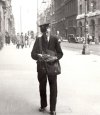
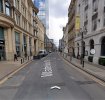


pjmburns
master brummie
No idea if this is the same person but from appointment bok 1851This is an image of one of the first Birmingham postmen. The uniform may be of interest to those researching the occupation.The design seems to have police uniform influences. Viv.
View attachment 172481
Source: British Newspaper Archive
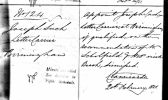
Chances are it’s the same Janice. Thanks. I see he’s referred to as “Letter Carrier” rather than Postman. Viv.
Viv, I was once a clerk in Post Office Telecoms and so eligible to join Boundless the rebranded Civil Service Motoring Association. We were able to rent an easy access wooden holiday lodge at Whitemead in The Forest of Dean enabling us to take my disabled father in law on holiday with us. There are a range of benefits for all ex-public service workers and Forces. There's a membership fee. DerekThe Post Office was a member of the Civil Service and Post Office Sanatorium Society. They had a hospital in Benenden Kent. Originally it was to treat members with TB, hence the wards with balconies onto which patients were wheeled for fresh air. It then expanded its range of treatments beyond TB and chest conditions. The hospital is still there, think it’s the Benenden Hospital now but is fully private.
When I was a member it was part contributory, but it didn’t cost much per month. I had an operation there in the early 1990s and the ward was full of British Telecom workers, who I believe were once Post Office Telecoms. Quite a change in health provision over the years. Viv.

